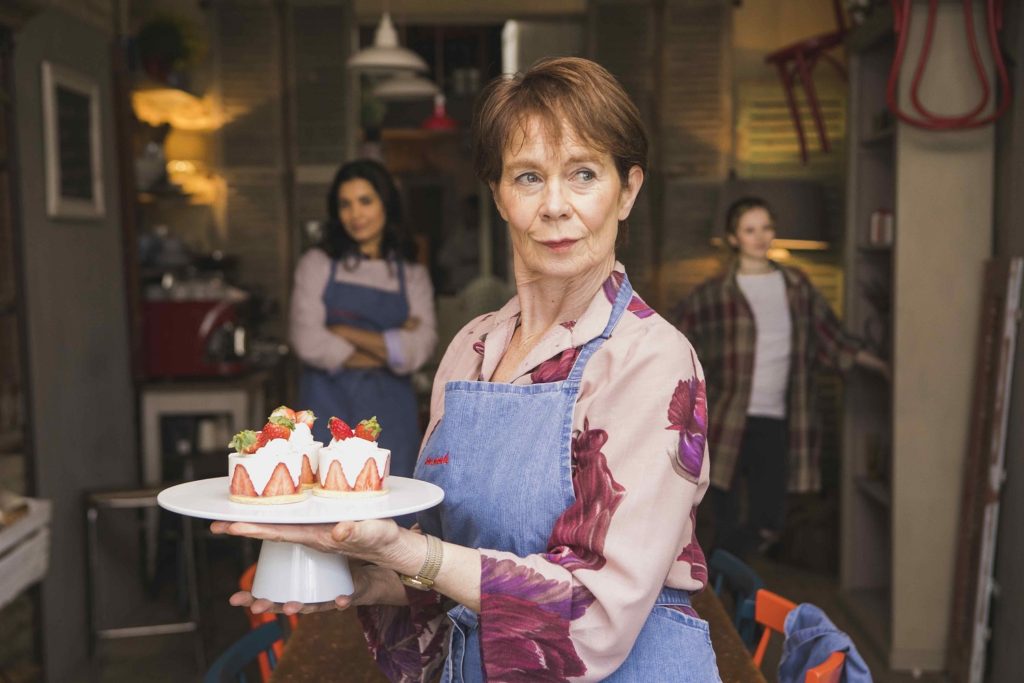Eliza Schroeder incorporated her London-based production company, Rainstar Productions, in 2008. She’s directed and produced several short films including “Matilda,” “First, Love?,” “Arm Candy,” “Ghetto Punk,” and “Chronophobe.” Her short films have been selected by various renowned international film festivals such as the Portobello Film Festival, New York Short Film Festival, Can Leicester International Short Film Festival, Short Film Festival of Los Angeles, and the Beijing International Film Festival.
“Love Sarah” marks Schroeder’s feature debut. The film is now available on VOD.
W&H: Describe the film for us in your own words.
ES: “Love Sarah” is an uplifting drama about a young woman who enlists the help of her mother’s best friend and her eccentric grandmother to fulfill her late mother’s dream of opening a bakery in Notting Hill.
It’s a story about love, hope, reconnecting, and giving life another chance.
W&H: What drew you to this story?
ES: I’ve always been interested in telling stories that involve headstrong women and I’m extremely drawn to telling stories of loss since I lost my own mother a few years ago.
I wanted to take this opportunity to give people who have lost a dear one a chance to see that there can be hope and light at the end of the tunnel if you join forces with the people that matter most to you.
W&H: What do you want people to think about after they watch the film?
ES: This is a lovely question. I’d love people to re-think the relationships with the ones who really matter to them and how they can potentially be worked on to make the bonds and friendships stronger.
I’d like my viewers to feel the pain that losing a dear one causes, but at the same time I would like them to see that there can be hope. I’d like to inspire them to give love and life another chance — even in the darkest of moments.
W&H: What was the biggest challenge in making the film?
ES: We were shooting in a tiny place that was functioning as our bakery and it was a creative challenge to make sure that we give our audiences enough interesting angles.
It was also challenging to have a big crew within this small space but we had a wonderful time together, albeit freezing a lot during a very cold winter’s shoot.
We also had a fairly short amount of time to shoot this quite extensive script, so timing was always important.
W&H: How did you get your film funded? Share some insights into how you got the film made.
ES: This is a film that has mainly been funded by relatives and film enthusiasts, and the producer, Rajita Shah, and I have both also invested our own capital into the film.
W&H: What inspired you to become a filmmaker?
ES: I’ve been drawing flipbooks and writing short stories from a very young age, I’ve always loved escaping into new, imaginative worlds. I later became a freelance photographer while doing my M.A. in Literature and it then became clear to me that I needed to combine the craft of storytelling and taking images to become a director.
W&H: What’s the best and worst advice you’ve received?
ES: The best is probably that learning by doing really is the way forward as a director. You need to jump in and learn your craft by shooting as much as you can, only then will you learn — mainly from your own mistakes.
I can’t remember any bad advice I have received. Lucky me!
W&H: What advice do you have for other female directors?
ES: To go out there and do it. Be passionate, hardworking, and bold, and join forces with like-minded people. It will cost you endless, sleepless days and nights to realize your first couple of short films but that’s the way to really discover and learn this craft.
W&H: Name your favorite woman-directed film and why.
ES: I love Nancy Meyers’ films. They are lighthearted yet have so much meaning and humor.
I’m also a big fan of Greta Gerwig. I think her style is fantastic and really embraces women.
W&H: How are you adjusting to life during the COVID-19 pandemic? Are you keeping creative, and if so, how?
ES: It’s taken me a while to adjust. I’ve had a stretch of not feeling inspired or creative at all, but I’m now finally feeling it again and am working on two projects I’m super excited about. Being creative whilst home schooling two kids with a toddler running around proves to be challenging but we also have unexpected moments of pure laughter and joy together and I’m really enjoying my time with them.
W&H: The film industry has a long history of underrepresenting people of color onscreen and behind the scenes and reinforcing — and creating — negative stereotypes. What actions do you think need to be taken to make Hollywood and/or the doc world more inclusive?
ES: We need to bring more people of color into the world of filmmaking, both in front of and behind the camera. It’s our responsibility, and there are such wonderful talents out there.
I am so pleased to see much more people of color on screen these days and have myself been working with two extraordinary talents behind the camera on “Love Sarah.”







